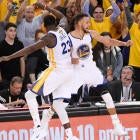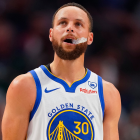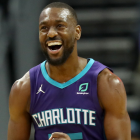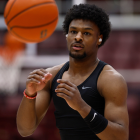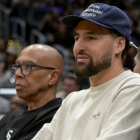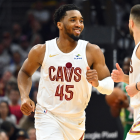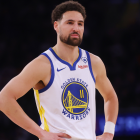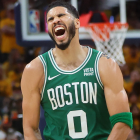The Golden State Warriors cemented their legacy as one of the best teams in NBA history by finishing off the Cleveland Cavaliers 129-120 in Game 5 of the NBA Finals on Monday, completing a magical 16-1 run through the playoffs. This always was the likely end result for the organization that collected arguably the most talent on one roster the league has ever seen.
Now that the season is over, let's take a look at what exactly we learned from this matchup, with an eye on the things we thought would be at stake before it started:
1. Warriors put the 'team' in superteam
Some thought this would be the best team ever as soon as it was assembled. Some thought there would be chemistry issues or complications when it came to getting four All-Stars to share the ball.
All season, every move the Warriors made was covered, so the growing pains -- early-season defensive struggles, a couple of high-profile crunch-time failures -- were magnified.
Many, many words have been written about Stephen Curry and Kevin Durant trying to coexist, but in the end had little trouble. Curry initially deferred to Durant too much, but the team knew it was at its best when the back-to-back MVP was aggressive. Golden State's offense, based on ball movement, player movement, timely cuts and spacing, inevitably meant the two of them needed to strike a balance. Both played like Finals MVPs, though Durant won it. The Warriors' impressive offensive numbers in the Finals, plus his late-game heroics in Game 3 and 39 in the clincher, show exactly why they wanted him.
Coach Steve Kerr admitted he had concerns about how Draymond Green would handle a reduced offensive role with Durant in the fold, but those were gone a couple of weeks into the season. Klay Thompson said from the start that he was "not sacrificing shit," and he was proven right. In fact, the Warriors' third and fourth All-Stars were key defenders on the game's biggest stage. The champs not only were talented, but also embraced Kerr's system.
2. Cavs' roster has limitations (at this level)
Cleveland is unmistakably a championship-caliber team, but Golden State exposed its warts. The strategies it used to slow down the Warriors last season weren't nearly as effective with Durant on the floor, and the Cavs' relative lack of two-way players hurt them.
Against almost anybody else, putting reserves Deron Williams, Kyle Korver and Channing Frye next to LeBron James is a recipe for success. It didn't particularly matter that this wasn't a strong defensive unit; nobody in the Eastern Conference could come close to stopping them. When James is able to create for himself or others in space, he is pretty much peerless. It's open look after open look.
In the Finals, though, those looks weren't quite as good, and Golden State punished Cleveland's weaker defenders. Possessions for both teams often came down to an MVP-level player putting the other team's least mobile defender in a pick-and-roll and then going from there. The Cavs executed in those situations to win Game 4, but they needed a record-setting night from 3-point range in order to pull it off.
The Cavaliers' simple problem is that the Warriors make play uncomfortable lineups. Is defensive versatility more important than Kevin Love's scoring and rebounding? Is Korver's gravity on the perimeter worth having Golden State target him on the other end? Even someone like Tristan Thompson, so vital to Cleveland's success, found himself watching from the bench at times when coach Tyronn Lue wanted more offense.
3. Warriors aren't about to slow down
The health of Andre Iguodala was a big question mark coming into this series, and this was particularly important because of his impending free agency. If he struggled or Golden State lost, his return might not be a sure thing. Days before winning the title, Iguodala all but guaranteed he'd be back next season, and Green implied that Shaun Livingston would re-sign, too. This will all be possible because Durant is reportedly willing to give up a few million dollars to keep the group together.
To be clear, it remains possible that the Warriors lose improving guard Ian Clark in free agency and it is uncertain what will happen with their array of big men. The core, however, should remain the same, making them the favorites to win it all again next season. Let's remember what general manager Bob Myers told Durant in the Hamptons last July:
In meeting, Bob Myers told Durant: Without you, we can another title or two. Without us, you might win too. Together? We'll win a bunch.
— Adrian Wojnarowski (@WojVerticalNBA) July 4, 2016
For Golden State, this is something special. For everyone else, it's just scary.
4. Cavs still largely go how Irving goes
Cleveland essentially knows what it is going to get from James in big moments. He can do just about everything a human being can do on a basketball court, and the Cavs rely on him to create the vast majority of their offense while being disruptive on defense. Their biggest variable Kyrie Irving. Irving is not the kind of player who consistently helps his team when he's not scoring efficiently, and his scoring is absolutely crucial when they're playing against top-notch defenses. Irving is one of the few players in the league who can make dominant defensive units look helpless.
In the first two games of the Finals, with Klay Thompson guarding him as well as possible, Irving never found his rhythm. After that, Thompson kept playing great defense, but Irving was incredible. That changed everything for Cleveland.
Irving could one day become a more well-rounded player, but for now the difference between him looking like a superstar and looking like an inefficient gunner is whether his shots are falling. The Cavs wouldn't have won the 2016 title without him making amazing one-on-one plays, but that doesn't make it any easier to go into a Finals game knowing that so much is riding on his hero ball. If they don't balance the roster, add more playmakers or change their offensive approach, that's the way this will go.
5. Warriors' center rotation was good enough
In the first few minutes of the opening game against Cleveland, a tentative Zaza Pachulia turned down a couple of easy layups. At the time, it was easy to imagine an old storyline returning -- did Golden State adequately address its frontcourt situation after losing Andrew Bogut and Festus Ezeli? Pachulia quickly snapped out of his funk, and even flipped in a ridiculous reverse layup in Game 1. His boxing out against Tristan Thompson was critical throughout the series, even though Golden State was clearly at its best going with small lineups.
Just like in the regular season, David West did just fine manning the middle with the second unit. JaVale McGee didn't play a ton against the Cavaliers, but that didn't matter. The Warriors would probably welcome them all back next season, so the only question is whether they will look for raises.









